|
|
|
Sort Order |
|
|
|
Items / Page
|
|
|
|
|
|
|
| Srl | Item |
| 1 |
ID:
108370
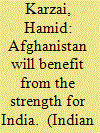

|
|
|
| 2 |
ID:
110324
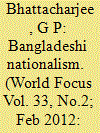

|
|
|
| 3 |
ID:
108996
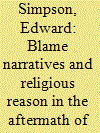

|
|
|
|
|
| Publication |
2011.
|
| Summary/Abstract |
Recent writing on religion in Gujarat has often confused political rhetoric with common religious belief and practice. Thus, religious categories have become caricatures standing for sociological realities and totalised worldviews. In this scheme, 'Hindus' and 'Muslims' are supposed to believe different things which ensure that they see and act in the world quite differently. In this paper, I examine the narratives of blame that emerged after the 2001 earthquake in Gujarat. The ethnography suggests that although religious identity plays a role in the way blame is cast, people of different religious communities also use common frames of logic and their shared experiences of shock and alienation to explain catastrophe. The religious reasoning of blame narratives is therefore shown to have a broader cultural existence outside the boundaries of particular religious identities.
|
|
|
|
|
|
|
|
|
|
|
|
|
|
|
|
| 4 |
ID:
126879
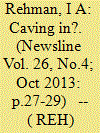

|
|
|
|
|
| Publication |
2013.
|
| Summary/Abstract |
Instead of challenging the militants religious credentials, the government appears to be capitulating to them.
|
|
|
|
|
|
|
|
|
|
|
|
|
|
|
|
| 5 |
ID:
148869
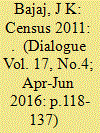

|
|
|
|
|
| Summary/Abstract |
The most significant piece of data from the count of religious
communities done during the census of 2011 is the rise of the proportion
of Muslims in the population of India by 0.8 percentage points. They
had a share of 13.43 per cent in the population of India in 2001; their
share is 14.23 per cent now. This is the third decade in a row when their
share has increased by or above 0.8 percentage points.
|
|
|
|
|
|
|
|
|
|
|
|
|
|
|
|
| 6 |
ID:
122655
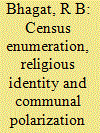

|
|
|
|
|
| Publication |
2013.
|
| Summary/Abstract |
Census is considered to be a scientific exercise. However, it leaves a deep impact on religious and ethnic identities. This is because through census enumeration not only are boundaries of communities fixed, but also actual size and growth are known. This adds a new sense to the identities of the religious communities in the sphere of democratic politics. In India, the census was started around 1872 during the British rule, seven decades after the first census was held in Great Britain in 1801. The question on religion was included right from the first Indian census, unlike the British census which only included it in 2001. This paper shows that the inclusion of the question on religion, and the consequent publication of data on size and growth of population by religion during British rule, invoked sharp communal reactions. The demographic issues found a core place in the communal discourse that continued in independent India. The paper argues that the demographic data on religion was one of the important factors that raised Hindu-Muslim consciousness and shaped the Hindu and Muslim relationship in both colonial and postcolonial India. As a result, several demographic myths have found a place in the communal discourse shaping the political imagination of India.
|
|
|
|
|
|
|
|
|
|
|
|
|
|
|
|
| 7 |
ID:
095480
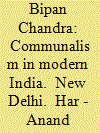

|
|
|
|
|
| Publication |
New Delhi, Har - Anand Publication, 2008.
|
| Description |
412p.
|
| Standard Number |
9788124114162, hbk
|
|
|
|
|
|
|
|
|
|
|
|
Copies: C:1/I:0,R:0,Q:0
Circulation
| Accession# | Call# | Current Location | Status | Policy | Location |
| 054907 | 305.8/BIP 054907 | Main | On Shelf | General | |
|
|
|
|
| 8 |
ID:
118910
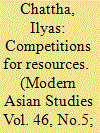

|
|
|
|
|
| Publication |
2012.
|
| Summary/Abstract |
This paper explores the part that the redistribution of evacuee property-the property abandoned by departing Hindus and Sikhs during the mass migrations after Partition-played in the institutionalization of corruption in Pakistan. By drawing on hitherto unexplored sources, including Pakistan's Rehabilitation Department papers, local police files and court records, it highlights the schemes of illegal appropriation, misappropriation, and paints a wholly convincing portrait of the scramble for millions of rupees worth of abandoned property in the towns and countryside of West Punjab. It shows how politicians, bureaucrats, powerful local notables and enterprising refugee groups grabbed properties, mainly by bribing officers charged with allocating them to incoming refugees, or by utilizing their personal contacts. The paper argues that the fierce competition for resources and temptations for evacuee property encouraged the emergence of a 'corruption' discourse which not only contributed to an atmosphere that was detrimental to democratic consolidation in the early years of Pakistan's history, but also justified later military intervention. This not only adds to the empirical knowledge of Partition and its legacies, but also makes a significant contribution towards our understanding of the transitional state in Pakistan.
|
|
|
|
|
|
|
|
|
|
|
|
|
|
|
|
| 9 |
ID:
123659
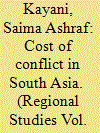

|
|
|
| 10 |
ID:
160072
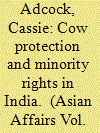

|
|
|
|
|
| Summary/Abstract |
Recent efforts to prevent cow-slaughter in India have prompted U.S. concern about violations of religious freedom. But although the politics of cow protection poses a significant threat to disadvantaged groups in India, efforts to ameliorate that threat through an international policy of religious freedom also carry serious risks. This paper reviews reports issued by the U.S. Department of State's Office of International Religious Freedom and by the U.S. Commission on International Religious Freedom. It argues that by unnecessarily portraying the politics of cow protection in terms of a stark conflict between Hindus and Muslims, they threaten to undermine the goal of reducing anti-minority discrimination and violence in India.
|
|
|
|
|
|
|
|
|
|
|
|
|
|
|
|
| 11 |
ID:
174914
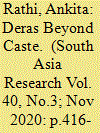

|
|
|
|
|
| Summary/Abstract |
In the northern regions of India, the rising popularity of alternative religious sects, prominently Deras, has sparked much interest in explaining this phenomenon. Current literature, based on case studies of specific Dalit Deras, relates the emergence of these religious sects to caste-based social discrimination and exclusion of lower castes by the mainstream Sikh religion. This article presents a case study of a small town, Patran, in the state of Punjab. Confirming the popularity of these alternative religious sects for upper and lower castes in the town, the article argues that the contemporary attractiveness of Deras needs to be understood also as a result of localised agrarian dynamics and related social pressures engendered by the process of rural to urban and agrarian to non-agrarian transition.
|
|
|
|
|
|
|
|
|
|
|
|
|
|
|
|
| 12 |
ID:
140369
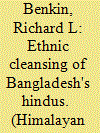

|
|
|
| 13 |
ID:
097724
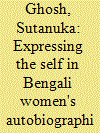

|
|
|
|
|
| Publication |
2010.
|
| Summary/Abstract |
This article discusses evidence from the autobiographical writings of three Bengali women to explore expressions of the self in such literature. Sarala Devi Chaudhurani, Santisudha Ghosh and Manikuntala Sen were contemporaries, all three active in different capacities in the various political formations that shaped the outcome of the struggle against colonial occupation. Their autobiographies lay bare the prescriptions they encountered as daughters and women and the choices they made, all the time straddling multiple worlds, occupying multiple subject positions.
The article contends that these autobiographies, along with other personal and public documents, reflect the construction of tortured, fractured female subjectivities that must continually negotiate with 'modernity' in early twentieth century Bengal. Consequently, the 'female self' in these autobiographies is not a securely rooted and stable entity but is constantly 'becoming', as the various fragments try to cohere around an elusive centre, 'modernity', which is itself a nebulous, unstable product of
|
|
|
|
|
|
|
|
|
|
|
|
|
|
|
|
| 14 |
ID:
093708
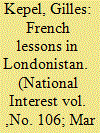

|
|
|
|
|
| Publication |
2010.
|
| Summary/Abstract |
MUSLIMS HAVE been landing on the shores of Britain and France for decades. And, as these populations arrived and settled in the Republic, Paris pursued a policy it believed would eventually lead immigrants to full cultural integration into French society. Meanwhile, London, facing a similar influx of foreigners, attempted to create a full-fledged multicultural polity. The former emphasized that what was shared between the new arrivals and their native hosts was crucial, their differences secondary. The latter argued that the British needed to respect the uniqueness of their immigrant neighbors-whether national, religious or ethnic-and that such a stance was at the core of a harmonious political system. In color-blind France, built on a long tradition of a strong, centralized state and the successful assimilation of southern and eastern Europeans-who have been migrating to the country since the nineteenth century-religious identity was not to interfere in public life. Under the French tricolor, state and nation were fused into the cradle of the one and indivisible Republic. In race-aware Britain, with Anglicanism as its established church, there was always room for different nationalities-English, Welsh, Scottish, Irish-under the Union Jack.
|
|
|
|
|
|
|
|
|
|
|
|
|
|
|
|
| 15 |
ID:
170177
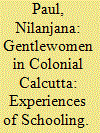

|
|
|
|
|
| Summary/Abstract |
This article shows how two pioneering institutions for female education in colonial Bengal, Bethune and Sakhawat Memorial Girls’ Schools, made significant contributions to female education at a time when women’s education was mostly restricted to home teaching. The study brings out the underlying contradictions between traditional and modern approaches towards education displayed in the goals, admission process and curriculum structure of these two schools. Analysing their respective contributions demonstrates that Bethune and Sakhawat Memorial Girls’ schools produced the modern Bengali bhadramahila (well-educated woman) who secured higher education, but was also rooted in traditional values. The final section illustrates how with the expansion of education in the twentieth century, the boundaries of the reformist zeal gradually blurred, so that educated women in Bengal could fight for greater equality.
|
|
|
|
|
|
|
|
|
|
|
|
|
|
|
|
| 16 |
ID:
139893


|
|
|
|
|
| Edition |
8th ed.
|
| Publication |
Srinagar, Chronicle Publishing House, 1967.
|
| Description |
ix, 304p.hbk
|
|
|
|
|
|
|
|
|
|
|
|
Copies: C:1/I:0,R:0,Q:0
Circulation
| Accession# | Call# | Current Location | Status | Policy | Location |
| 001380 | 954.6/KAU 001380 | Main | On Shelf | General | |
|
|
|
|
| 17 |
ID:
119729
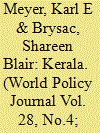

|
|
|
|
|
| Publication |
2011.
|
| Summary/Abstract |
Thiruvananthapuram, India-Rarely does the Indian state of Kerala capture the world's attention. It did so in July when a Hindu temple in its state capital was found to contain a royal ransom of solid gold statues and coconuts, piled together in a sealed vault along with sacks of diamonds. The treasure's value is estimated at $22 billion, which likely makes the temple the richest in South Asia. Still, having recently visited Kerala, a splinter of land at India's southwestern tip, we wondered whether the excited accounts of the discovery obscured a more relevant and remarkable story.
|
|
|
|
|
|
|
|
|
|
|
|
|
|
|
|
| 18 |
ID:
182851
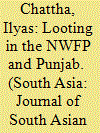

|
|
|
|
|
| Summary/Abstract |
According to Police Special Branch intelligence reports, amidst the chaos of Partition, over 60,000 ounces of gold were stolen from fleeing Hindus and Sikhs in 1947. Alongside political identity and religious organisation and territorialisation, desire for wealth or property was a key trigger for the continuation of the Partition violence. This article documents organised communal violence which erupted in the NWFP and Punjab during 1946–47 using largely underutilised police and intelligence reports from the period. The empirical focus of the article is two-fold. First, to show that the intercommunity violence triggered in these provinces was organised and funded by the Muslim League through its volunteer wings, even if specific perpetrators were locals. Second, that looting was a feature of locally-rooted violence to acquire property owned by non-Muslim minorities. As well, individual motives for revenge or a desire to best one’s business rival fuelled the violence alongside ideological imperatives such as the commitment to the idea of Pakistan.
|
|
|
|
|
|
|
|
|
|
|
|
|
|
|
|
| 19 |
ID:
126094
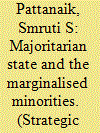

|
|
|
|
|
| Publication |
2013.
|
| Summary/Abstract |
The problem confronting the Hindu minority in Bangladesh is analysed in this article within the framework of a majoritarian state, which embodies the socio-cultural ethos of the majority community in its effort to establish itself as a nation state with a unique history. Such a state by its very nature marginalises the minorities, who are considered unequal in the construction of the 'nation state' narrative even though constitutionally they enjoy equality as citizens. While the article looks at the role of the Hindus in politics in former East Pakistan and later in Bangladesh, it also explores whether the approach adopted by the Hindu minority in recent years has provided physical security, economic and political opportunities, and made them important stakeholders. The article also analyses the future of minorities in the context of the larger national identity debate in Bangladesh.
|
|
|
|
|
|
|
|
|
|
|
|
|
|
|
|
| 20 |
ID:
119603
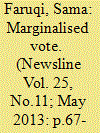

|
|
|
|
|
|
|
|